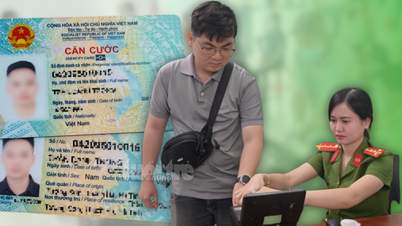On November 27, 2023, the National Assembly officially passed the Law on Identity Cards, replacing the 2014 Law on Citizen Identity Cards. The Law on Identity Cards officially came into effect on July 1, 2024. Accordingly, the citizen identity card will also be called by its new name, the identity card.
According to Article 22 of the 2023 Identity Card Law, the integration of information into identity cards and the use and exploitation of integrated information are regulated as follows:
- Integrating information into the identity card involves adding information beyond the basic identity details to the card's storage, using encrypted data. This information is integrated at the citizen's request and must be verified through national or specialized databases.
- The information integrated into the identity card includes health insurance card information, social insurance book, driver's license, birth certificate, marriage certificate, or other documents as decided by the Prime Minister, excluding information on documents issued by the Ministry of National Defense .
- The use of information integrated into the identity card is equivalent to providing or using documents containing that information in carrying out administrative procedures, public services, transactions, and other activities.
- Citizens request that their information be integrated into the national identity card when needed or when applying for, renewing, or replacing the card.
- The exploitation of the encoded integrated information in the identity card is regulated as follows:
+ Using specialized equipment to extract information integrated into the encrypted storage section of the identity card;
+ Using information from the identity card via specialized equipment to retrieve and utilize integrated information through the National Population Database and the electronic identification and authentication system;
+ State agencies, political organizations, and socio-political organizations may utilize the integrated information encoded in the identity card to perform their assigned functions and tasks;
+ Organizations and individuals may exploit the encoded information integrated into citizens' identity cards only with the consent of those citizens.
Therefore, according to the regulations mentioned above, integrating information such as health insurance cards, social insurance books, driver's licenses, birth certificates, marriage certificates, or other documents into the identity card is not mandatory. This integration is only required when citizens request it or when applying for, renewing, or replacing their identity card.
Procedures for issuing identity cards from July 1, 2024.
The procedure for issuing identity cards according to Article 23 of the 2023 Identity Card Law is as follows:
- The procedures for issuing identity cards to individuals aged 14 and above are as follows:
+ The receiving officer checks and verifies the information of the person applying for the identity card from the National Population Database, national databases, and specialized databases to accurately identify the person needing the identity card; if the information of the person needing the identity card is not yet in the National Population Database, the procedure for updating and adjusting the information in the National Population Database must be carried out in accordance with Clauses 1, 2, and 3 of Article 10 of the 2023 Identity Card Law;
+ The receiving officer collects personal identification information and biometric data, including facial images, fingerprints, and iris scans, of the person applying for the identity card;
+ Individuals needing an identity card should check and sign the identity card information collection form.
+ The person receiving the card will issue an appointment slip for collecting the identity card.
+ Identity cards will be delivered to the location specified in the appointment slip; if the person requesting the identity card is to have it delivered to a different location, the identity card management agency will deliver the card to the requested location, and the person must pay the delivery service fee.
- Individuals under 14 years of age or their legal representatives may request an identity card from the identity card management agency. The procedure for issuing identity cards to individuals under 14 years of age is as follows:
+ Legal representatives carry out the procedure for issuing identity cards to individuals under 6 years of age through the public service portal or the national identification application. If the individual under 6 years of age has not been registered at birth, the legal representative carries out the identity card issuance procedure through procedures linked to birth registration on the public service portal, the national identification application, or directly at the identity card management agency. The identity card management agency does not collect personal identification information or biometric information from individuals under 6 years of age.
+ Individuals aged 6 to under 14 years old, accompanied by their legal representative, must go to the identity card management agency to have their personal information and biometric information collected as stipulated in point b, clause 1, Article 23 of the 2023 Identity Card Law.
The legal representative of a person aged 6 to under 14 years old will carry out the procedure for issuing an identity card on behalf of that person.
- In the case of individuals lacking legal capacity or those with difficulties in understanding and controlling their actions, a legal representative must assist them in completing the procedures stipulated in Clause 1, Article 23 of the 2023 Identity Card Law.
- In cases where an identity card is refused, the identity card management agency must provide a written response stating the reasons.
Minh Hoa (compiled)
Source: https://www.nguoiduatin.vn/co-bat-buoc-phai-tich-hop-giay-phep-lai-xe-bhyt-vao-the-can-cuoc-a669988.html


















































































































Comment (0)